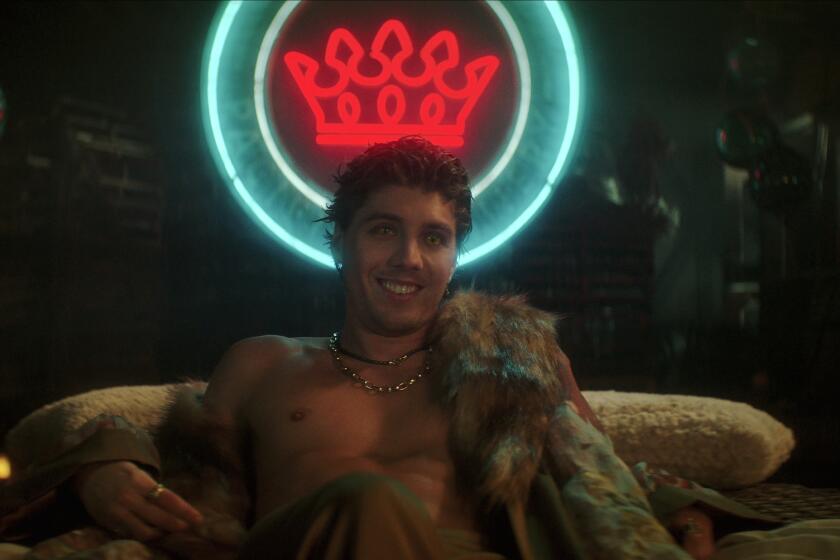Hollywood trying to avoid villain role in film violence
The mass shooting at a “Dark Knight Rises” screening last week has Hollywood quietly squirming. Despite the entertainment industry’s famously liberal leanings, violent content has long been its stock in trade — leading creators of movies, TV shows and video games to contemplate what role if any their work may have played in the violence.
The fact that the Aurora, Colo. massacre occurred at a post-midnight screening of a film depicting murder and mayhem nonetheless has triggered a rare bout of soul searching in Hollywood.
“Like every person who works in movies and is following this event, I’m asking myself what are we responsible for, if anything,” said Rob Cohen, a director-producer of edgy films such as “XXX,” “Stealth” and the upcoming “Alex Cross.”
PHOTOS: Scene of the shooting | Hollywood reacts
“Some say we’re complicit in this violence and I’m not sure we are,” he said. “But, it does give me great pause. We want our movies to be shown to the widest possible audience — we are in a commercial business — but I now have to look deeper.”
Kurt Sutter, the writer-producer of such TV shows as”Sons of Anarchy”and “The Shield,” is also looking inward.
“Woke up to the news about shooting,” he said in a Twitter message last Friday after 12 people were killed and 58 injured. “This kinda thing always makes me question my liberal use of violence in storytelling.”
TIMELINE: Mass shootings in the U.S.
All over Hollywood, studio executives, filmmakers and other entertainment professionals were having similar conversations. But few were willing to talk on the record, fearing that their comments may suggest a link between violence and violent images that has not been empirically established.
And then there is this: Violence is good for the box office. Talking about corporate responsibility to tone down on-screen aggression could leave executives open to accusations of hypocrisy when they release their next blood-soaked blockbuster.
Gun control, not Hollywood violence, should be the topic of the moment, one studio executive said. That too, however, was not for attribution.
Warner Bros., which released “The Dark Knight Rises,” has come under the most scrutiny. Over the weekend, the studio took the rare step of not releasing box office receipts for what is shaping up to be one of the year’s biggest blockbusters. On Monday the Burbank studio released the weekend’s ticket sales, without crowing that it was the third biggest opening ever.
Warner also tiptoed through its decision to donate money to victims of the shooting, declining to divulge the amount and doing so without the fanfare and news releases that normally accompany such contributions. The studio also decided to delay the release of its upcoming film “Gangster Squad” in order to edit a scene featuring a shoot-up in a movie theater.
Independent producer Harvey Weinstein, who has released all of director Quentin Tarantino’s violence-laden films — from “Pulp Fiction” to his upcoming revenge picture “Django Unchained” — suggested to the Huffington Post that he, Tarantino, Martin Scorsese and “all of us who deal in violence in movies” should sit down ... and discuss our role in that.”
PHOTOS: Hollywood backlot moments
Kevin Reilly, entertainment president Fox Broadcasting, called what happened a “terrible tragedy,” however he did not think it would affect his network as it is already trying to be careful with the level of violence on the screen.
“I don’t anticipate any changes in our business,” Reilly said, as the network routinely polices its airwaves. “We look at everything.”
Hollywood, of course, wasn’t the first to inject violence into storytelling.
“From the cave paintings of animal hunts to ‘The Iliad,’ action and adventure have been an integral part in storytelling,” said Frank Gibeau, studio president of Electronic Arts, a video game publisher based in Redwood City, Calif., that puts out “The Sims,” “Madden NFL” and “Medal of Honor,” a shooting game borne out of Steven Spielberg’s film”Saving Private Ryan.”
“But it’s hard to imagine how someone can suggest that the film playing that night in any way provoked this horrible crime,” Gibeau said. “Rational people know the difference between fantasy and real violence.”
Most researchers agree that at best, on-screen violence is one of many risk factors contributing to aggressive, though not necessarily criminal, behavior.
For mass shootings, “there are other factors such as antisocial personality, depression, psychosis, suicidal tendencies and so on,” said Steve Kirsh, professor of psychology at the State University of New York in Geneseo and the author of “Media and Youth: A Developmental Perspective.” “Media violence isn’t even considered an influence.”
There is, however, a correlation between the school yard variety of aggression and exposure to movie, game and TV violence, said Joel Dvoskin, a clinical psychologist and co-editor of “Using Social Science to Reduce Violent Offending.”
“But correlation is not the same thing as causation,” Dvoskin said. “Kids who are more violent are also more intrigued by violent imagery. It’s also likely that some violent imagery can influence the manner in which people act out their aggression.”
Hollywood director Cohen said that audience identification with characters can be powerful — pointing out that Colorado shooting suspect James E. Holmes was apparently influenced by Heath Ledger’s portrayal of the Joker character in the previous Batman movie, “The Dark Knight.”
“The creation of such an iconic character — the Joker — played by such a charismatic actor, Heath Ledger, got internalized by a disturbed young man,” Cohen said.
James Steyer, chief executive of Common Sense Media, a nonprofit group that reviews entertainment media for kids, said that in the wake of the shooting, this would be a good time for the entertainment industry to take a public stance against violent images.
“Hollywood and other creators of entertainment have incredible power to shape the hearts and minds of young people,” he said. “And that power comes with great responsibility to think through the images and messages contained in their creations.”
Times staff writer Joe Flint contributed to this report.
More to Read
The biggest entertainment stories
Get our big stories about Hollywood, film, television, music, arts, culture and more right in your inbox as soon as they publish.
You may occasionally receive promotional content from the Los Angeles Times.






